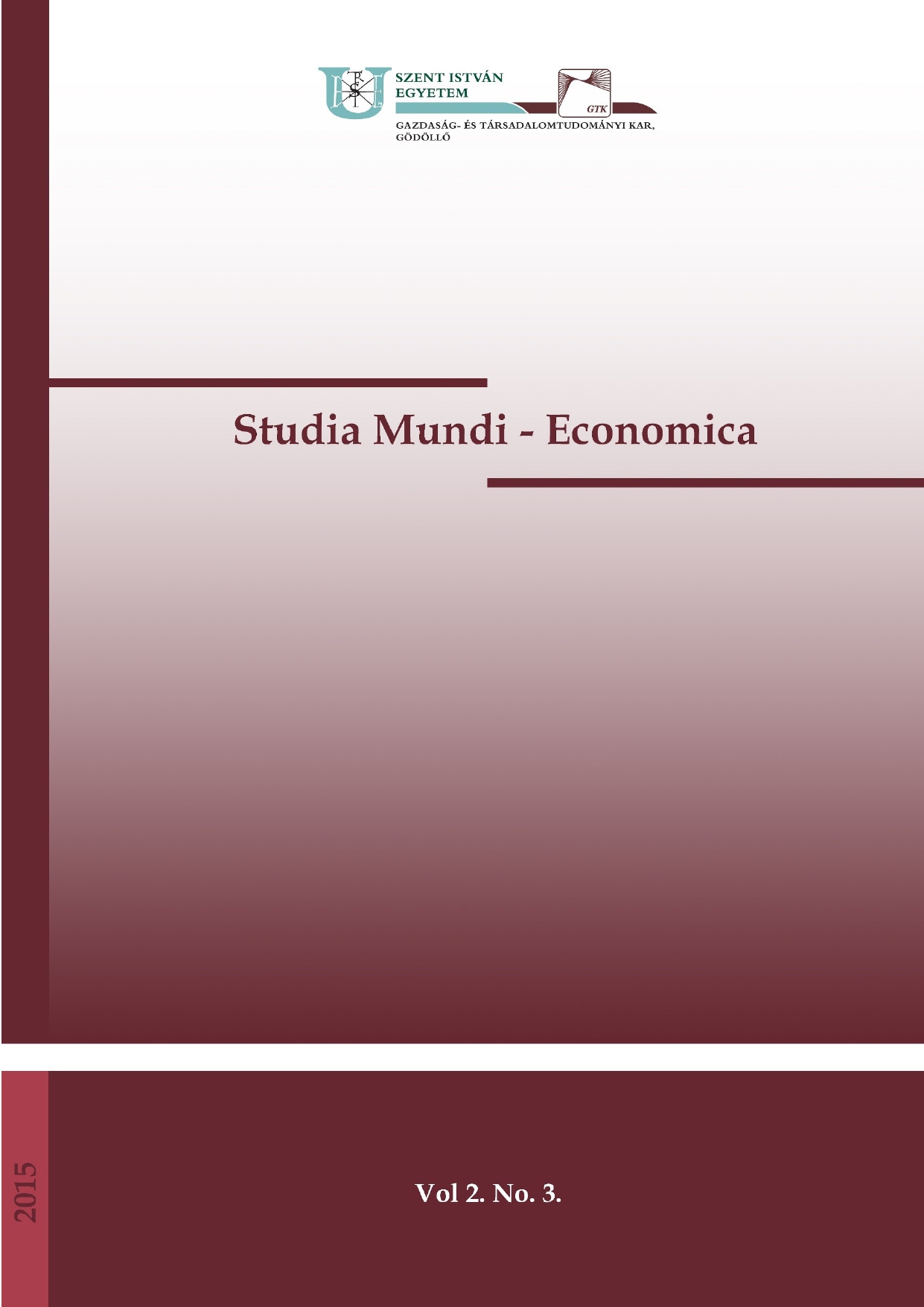“Nehezítettt gyakorlatok”a multikulturális szervezetek kommunikációjában
DOI:
https://doi.org/10.18531/Studia.Mundi.2015.02.03.12-20Kulcsszavak:
interkulturális kommunikáció, multikulturális döntéshozatal, stressz-szint, interakció, a kommunikáció gátlásaAbsztrakt
Egy szervezetben gyakran kell magas stressz-szintet kiváltó feladatokat végezni, például nagy téttel járó döntésekről tárgyalni. Ezek lelkileg akkor is megterhelők, ha honi kulturális környezetben, saját anyanyelvet használva történnek. Ha multikulturális hatások is nehezítik a döntéshozatalt, a feszültség fokozódhat, mivel egyszerre hatnak nyelvi, nyelvhasználati, az interkulturális interakciók szociál-pszichikai körülményei és a döntéshozók eltérő döntési mechanizmusai. Ez fokozza a stresszt. Kísérletek ugyanakkor azt bizonyítják, hogy a fokozott stressz gátolja a kommunikációt.
Hivatkozások
Adler, N. J. Gundersen, A. (2008): International Dimensions of Organizational Behavior. (Fifth Edition). Thomson. South-Western, Mason, OH
Balasubramanian, P. (2011): Cross-Cultural Decision Making: Impact of Values and Beliefs on Decision Choices. CRC Press.
Borgulya Iné (1999): Sztereotípiák, előítéletek és az interkulturális kommunikáció. Marketing Menedzsment1995/6 pp. 54-57
Borgulya Iné Vető Á. (2010): Kommunikációmenedzsment a vállalati értékteremtésben. Budapest, Akadémiai Kiadó
Borgulya Iné Vető Á. (2014): Kulturális távolságok. Budapest, Typotex Kiadó
Boromissza D. (2003): Az interkulturális félreértések kutatásának fő irányvonalai. Szociológiai Szemle. 2003/4. Pp. 76-87
Dietrich, R. (2007): Psycholinguistik. Metzler Vlg, Stuttgart
Frankó K. (2011): Interkulturelle Kommunikation in Ungarn tätiger Unternehmen aus dem deutschsprachigen Raum. München, Rainer Hampp Verlag
Gumperz, J.J. (1995): Mutual Inferencing in Conversation. In: Markova, I., Graumann, C.E. és Foppa, K. (Szerk.) Mutualities in Dialog. Cambridge, Cambridge University Press, pp. 101.123
Hidasi J. (2004): Interkulturális kommunikáció. Budapest, Scolar kiadó
Hofstede, G. (1980): Culture’s Consequences. International Differences in Work- Related Values. London, Beverly Hills DOI: http://dx.doi.org/10.1177/017084068300400409
Kluckhohn, F. R. Strodtbeck, F.L. (1961): Variations in Value Orientations. Evanston IL, Elmsford NY, Row, Peterson & Co. DOI: http://dx.doi.org/10.2307/2573641
Martinsons, M. G. (2001): Comparing the Decision Styles of American, Chinese and Japanese Business Leaders. Best Paper Proceedings of Academy of Management Meetings, Washington, DC, August 2001. Available at SSRN: http://ssrn.com/abstract=952292 (2015. május 10.)
Matthew, M. R. (2011): Explaining Cultural Differences in Decision Making Using Decision Field Theory. CRC Press. pp. 17–33.
Neyer, A-K. Harzing, A-W. (2008): The impact of culture on interactions: five lessons learned from the European Commission. European Management Journal. Vol. 26. 325-334 p. DOI: http://dx.doi.org/10.1016/j.emj.2008.05.005
Oksaar, E. (1991): Problematik im interkulturellen Verstehen. In: Dietrich-Müller, B. (Szerk.): Interkulturelle Wirtschaftskommunikation. München, Iudicium Verlag, pp. 13-26
Schwartz, S. H. (1994): Are there universal aspects in the content and structure of values? Journal of Social Issues, 50. pp. 19-45. DOI: http://dx.doi.org/10.1111/j.1540- 4560.1994.tb01196.x
Starcke, K., Wolf, O.T., Markowitsch, H. J. Brand, M. (2008): Anticipatory stressinfluences decision making under explicit risk conditions. Behavioral Neuroscience, Vol. 122, 1352– 1360 p. DOI: http://dx.doi.org/10.1037/a0013281
Stewart, E.C. (1985): Culture and Decision-Making. In: Gudykunst, Stwart és Ting Toomey Szerk.: Communication, Culture and Organizational Processes. Beverly Hills, Sage 177-212 p.
Thomas, A. (1991): Kulturstandards in der internationalen Begegnung. Saarbrücken, Verlag für Entwicklungspolitik
Tong, Y-Y. (2011): Why do People Think Culturally When Making Decisions? Theory and Evidence. CRC Press. pp. 53–65
Trompenaars, F.(1993): Riding the Waves of Culture. London, Nicholas Brealey Publ.,
Ungerer, D.: (2006): Stress in der Kommunikation. Erkenntnisgewinnung durch Sprachsteuerung. Beitraege zur inneren Sicherheit Bd. 29: Nachrichtendienstpsychologie. Hrsg.: Schwan, S. és Litzcke, S.M.pp. 87 - 117
Vetter, B.; Gasch, B. és Padosch, S.A. (2015): Medizinisches Handeln in Komplexen Notfallsituationen. Der Anaesthesist 4/2015. pp. 298 DOI: http://dx.doi.org/10.1007/s00101- 015-2423-2
Vitell, S.J., Nwachukwu, S.L. Barnes, J.H. (1993): The Effects of Culture on Ethical Decision-Making: An Application of Hofstede's Typology.Journal of Business Ethics. Vol. 12 753-760 p. DOI: http://dx.doi.org/10.1007/BF00881307
White, M. (2015): How stress impacts decision making. www.management-issues.com (2015.február 25.)
Letöltések
Megjelent
Folyóirat szám
Rovat
License
Copyright (c) 2015 Borgulya Ágnes

This work is licensed under a Creative Commons Attribution-NonCommercial-NoDerivatives 4.0 International License.
A folyóirat Open Access (Gold). Cikkeire a Creative Commons 4.0 standard licenc alábbi típusa vonatkozik: CC-BY-NC-ND-4.0. Ennek értelmében a mű szabadon másolható, terjeszthető, bemutatható és előadható, azonban nem használható fel kereskedelmi célokra (NC), továbbá nem módosítható és nem készíthető belőle átdolgozás, származékos mű (ND). A licenc alapján a szerző vagy a jogosult által meghatározott módon fel kell tüntetni a szerző nevét és a szerzői mű címét (BY).






